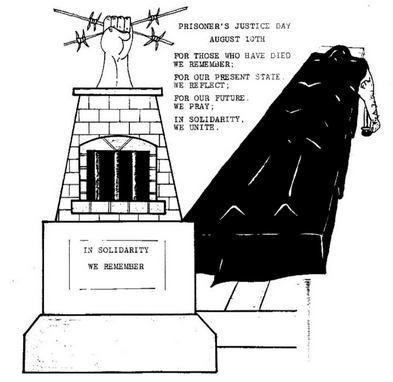Prisoners’ Justice Day Organizing
Prisoners’ Justice Day (PJD) emerged as a day of non-violent resistance to penal repression initiated by imprisoned people in commemoration of the death of Eddie Nalon who was left to die alone in the segregation unit of Millhaven maximum-security penitentiary on August 10th, 1974. PJD was first observed in 1975, and in 1976 imprisoned people at Millhaven issued a communication calling for one-day hunger strikes in opposition to the use of solitary confinement and in support of prisoners’ rights in memory of Eddie Nalon and Robert Landers, who also died alone in solitary confinement.

Since then, PJD has become an internationally-recognized day of solidarity and action, both inside and outside the prison walls, to commemorate unnatural deaths in custody and to demand justice for the human rights atrocities that states and their officials authorize and engage in. At the first PJD, people incarcerated at Millhaven produced a list of demands to reduce the harms they experienced behind bars. Many of these demands still remain unaddressed with the exception of prisoners’ right to vote federally, which was fought and won through a charter challenge led by Rick Sauve. If you want to learn more about the history of PJD see our pamphlet. PJD 2021 Info Pamphlet
|
Original Prisoners’ Justice Day Demands To attain:
|
PJD is observed each year inside and outside the prison walls with many events and direct actions planned throughout the world (e.g., memorial services, hunger strikes, labour strikes, vigils, talks, panels, social media campaigns, letters to political leaders, protests,nation-wide broadcast, etc.) to commemorate deaths in custody and to demand an end to the violence of criminalization and punishment. CPEP continues to be involved in organizing PJD events and solidarity actions on the unceded and unsurrendered territory of the Algonquin people (so-called Ottawa) to fight for liberation from the carceral state. On PJD incarcerated people, families, and the community peacefully advocate for prisoner justice, carceral abolition, human rights of prisoners, and listen to the experiences of those in prison and formerly incarcerated.
On social media, we encourage you to join the conversation by tweeting with different hashtags such as
#PrisonKills #divert #decarcerate #DemandPrisonsChange in the short-term, while working #TowardAbolition and a #JustTransitionFromThePIC for captives and captors alike in the long-term. #BuildCommunitiesNotCages #PJD
Demands and statements from prisoners and formerly incarcerated people
Each year we receive statements from prisoners’ that are currently incarcerated, many of which are held captive at the Ottawa-Carleton Detention Centre. Here is what they have to say:
- Incarcerated Person from central Canada who wishes to remain Anonymous
- Anonymous Individual from Stony Mountain
- A recording from Dylan, a friend of Brandon Marchant
**This feature is being updated as more demands and statements are received from the JAIL Hotline

Support PJD
It is not enough to shed tears and ask for change – we must demand it. Support PJD by purchasing a t-shirt, attending an event, making speeches, sharing information on social media about the need for carceral abolition, donating to prisoner justice collectives, become a penpal, purchase and read a book on abolition, and demanding better from politicians.
Learn More about Alternatives to Policing and Imprisonment
The Mobile Crisis Team – Community Based
Collaborative Justice Project Ottawa
We all collectively get to come up with doing something better and more supportive.
“For those who have died
We remember
For our present state
We reflect
For our future
We pray
In solidarity
We Unite”
-Cover of “highwitness news” Millhaven, July 1986
What does PJD mean to you? Share your stories, artwork, poems, or experiences with us.
Email us at pjdottawa@gmail.com to submit your stories, art, or experiences.
Getting involved with Prisoners’ Justice Day and Beyond
If you want to get further involved with prisoner justice organizing visit the link below for information on local events, collectives, and organizations to donate to and volunteer with. Getting Involved: Prisoners’ Justice Day & Beyond
Further resources
History of Prisoners’ Justice Day by Vancouver Prison Justice Day Committee
Origin of Prisoners’ Justice Day by Saskatchewan Manitoba Alberta Abolition Coalition
Building the world we want: A roadmap to police free futures in Canada by Robyn Maynard
